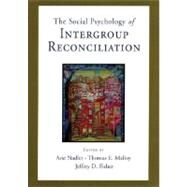Social Psychology of Intergroup Reconciliation From Violent Conflict to Peaceful Co-Existence
, by Nadler, Arie; Malloy, Thomas; Fisher, Jeffrey D.- ISBN: 9780195300314 | 0195300319
- Cover: Hardcover
- Copyright: 3/10/2008
The volume begins with an overview by Herbert Kelman discussingreconciliation as distinct from related processes of conflict settlement andconflict resolution. Following that, the first section of the volume focuses onintergroup reconciliation as consisting of moving beyond feelings of guilt andvictimization (i.e., socio-emotional reconciliation). These processes includeacceptance of responsibility for past wrongdoings and being forgiven in return.Such processes must occur on the background of restoring and maintainingfeelings of esteem and respect for each of the parties. The chapters in thesecond section focus on processes through which parties learn to co-exist in aconflict free environment and trust each other (i.e., instrumentalreconciliation). Such learning results from prolonged contact betweenadversarial groups under optimal conditions. Chapters in this section highlightthe critical role of identity related processes (e.g., common identity) andpower equality in this context. The contributions in the third part apply thesocial-psychological insights discussed previously to an analysis of real worldprograms to bring reconciliation (e.g., Tutsis and Hutus in Rwanda, Israelis andPalestinians, and African societies plagued by the HIV epidemic and the Westernaid donors). In a concluding chapter Morton Deutsch shares his insights onintergroup reconciliation that have accumulated in close to six decades of workon conflict and its resolution.







